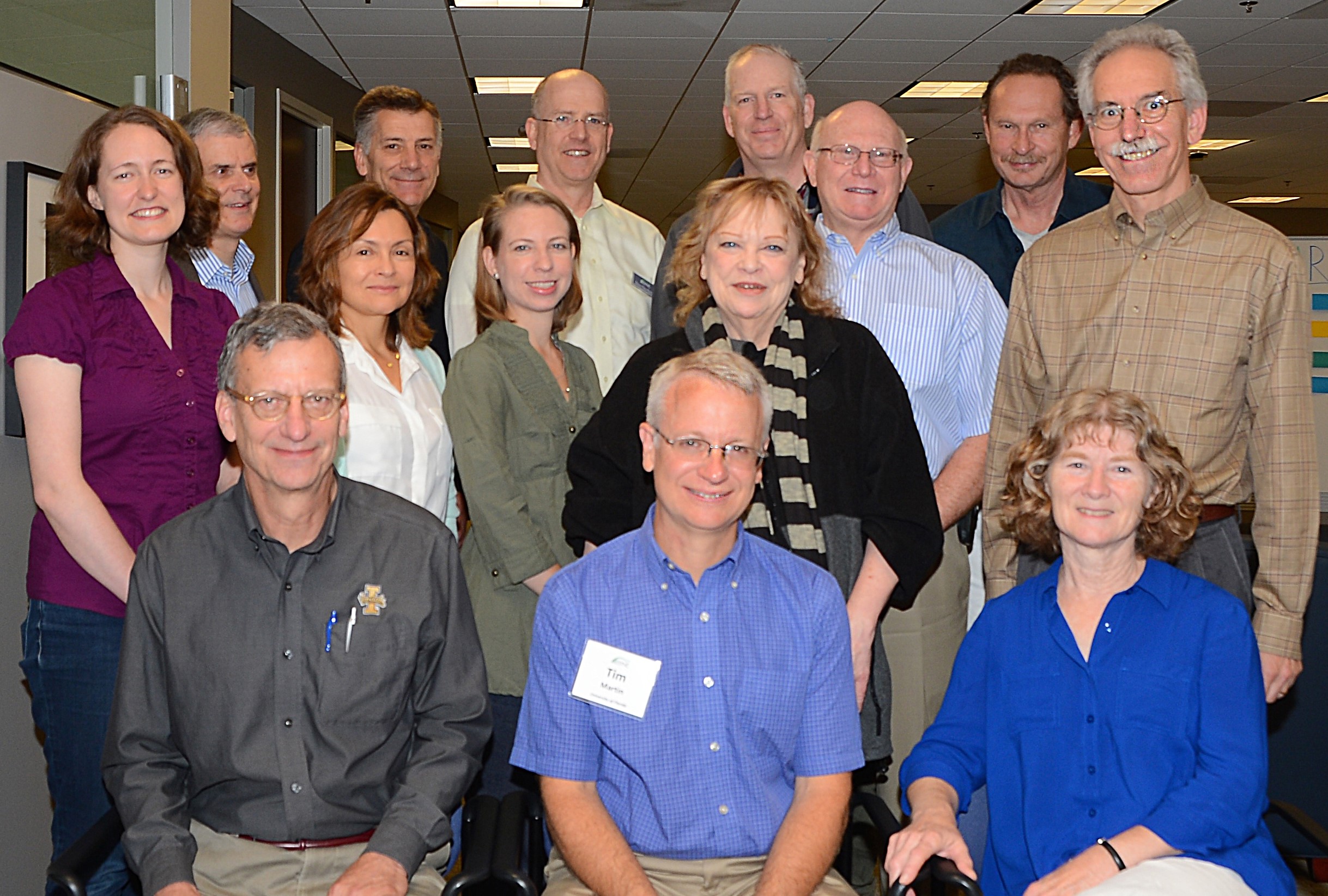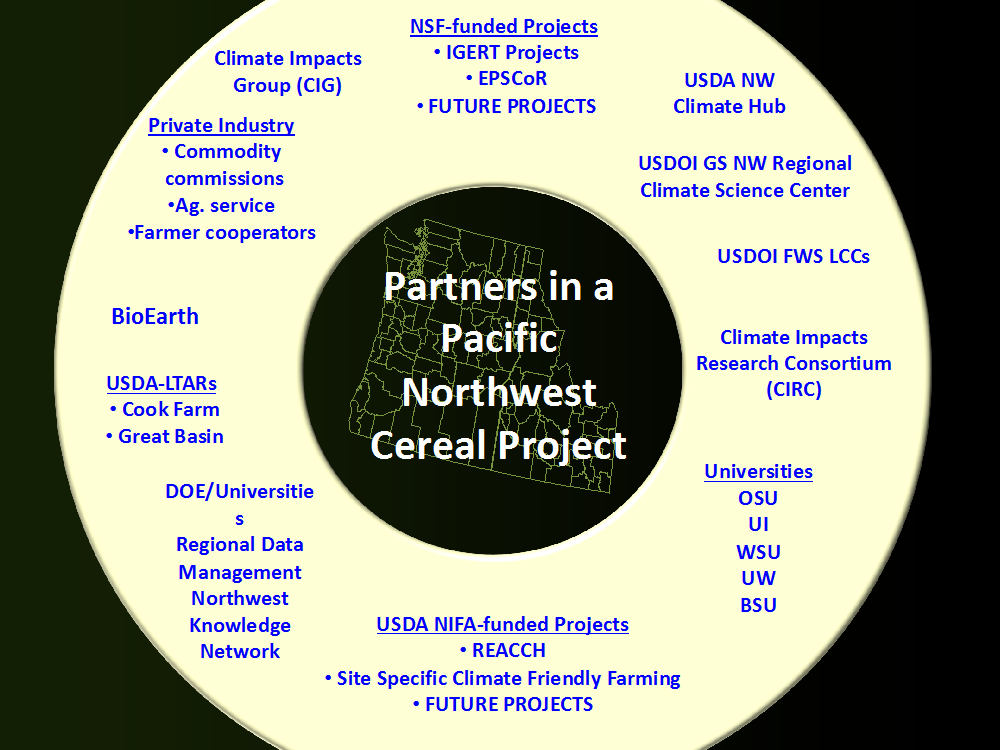Beyond REACCH: Framework for Long-term Interdisciplinary Research
The aim of the Wheat Agronomy EWG is to “bring together experts from a broad range of disciplines (vs. a silo approach) who would all contribute to the enhancement of the wheat phase as part of a systems agronomy approach that will meet the global challenges facing wheat growers and end-users today and well into the future. Emphasis will be placed on a systems agronomy approach that will enhance synergies to close the gap between genetic and on-farm yields but also meet societal goals around quality, sustainability and consistent supply considerations in the face of increasing demand and climate change.” (http://www.wheatinitiative.org/activities/expert-working-groups/wheat-agronomy)
Wheat initiative expert working group on wheat agronomy
Issue: As agriculture adjusts to changing climates while mitigating emissions of greenhouse gases, there is a pressing need to consider all the elements of production systems comprehensively. Research and interventions that consider only one or a few elements of production take the risk of failing to account for the effects of interacting biological, social, and economic components of these systems. International efforts to improve yields of pivotal crops like wheat, rice, and potatoes sometimes fall into a nonintegrated approach or emphasize genetic improvement over other factors necessary for realizing yield potentials. There is a need to raise awareness of these issues and initiate efforts to address them.
Action taken: We sponsored a workshop, "Transitioning Cereal Systems to Adapt to Climate Change,” in November 2015, collocated with the Entomological Society of America and the Tri- Societies meetings in Minneapolis/St. Paul, MN.
Results: Workshop attendees recognized the importance of integrated approaches to improving and stabilizing wheat production. Sanford Eigenbrode (REACCH Project Director) and Bill Pan (REACCH), along with conference participant John Kirkegaard (CSIRO, Australia), worked with Brian Beres (Agricultural and Agri-Food Canada), to prepare a proposal for an Expert Working Group (EWG) in Wheat Agronomy, to join the other Expert Working Groups sponsored by the International Wheat Initiative. The Agronomy EWG was approved and had its inaugural meeting at Tri-Societies 2016. Its membership has grown to 40 scientists worldwide, and it was represented at the Wheat Initiative Jamboree, Dec. 6-7, 2016, in Frankfurt, Germany.
The Wheat Agronomy EWG is still growing. Its first effort will be to assemble a research inventory from each region of the world where wheat is grown. This process will identify gaps and opportunities for international collaboration. The effort represents an ongoing impact of REACCH on wheat production and climate change worldwide.

Authors meeting at the National Center of Social and Ecological Synthesis (SESYNC) during preparation of “Leading Large Transdisciplinary Projects Addressing Social-Ecological Systems: A Primer for Project Directors”, June 2016.
Improving leadership for large transdisciplinary projects
Issue: Changing and variable climates will affect agricultural production and other coupled human and natural systems for the foreseeable future. Effective responses will require large-scale, long-term, broadly integrated, transdisciplinary projects like REACCH. Leading such projects can be challenging and requires a specialized set of skills and approaches. Future leaders can benefit from the experience and insights of current large-project directors.
Action taken: Sanford Eigenbrode (REACCH director) worked with Lois Wright Morton (Iowa State University) and Timothy Martin (University of Florida) to convene a workshop and develop a guide for future directors of large, transdisciplinary projects addressing social-ecological systems. All three collaborators were directors of large Coordinated Agricultural Projects addressing climate change (CAPs) sponsored by the U.S. Department of Agriculture’s National Institute of Food and Agriculture (USDA-NIFA).
The workshop was sponsored by the National Center for Social and Ecological Synthesis (SESYNC) and held at its headquarters in Annapolis, MD, in June 2016. The 12 participants included directors of large projects like REACCH from around the United States and in Central America. Representatives from academic institutions, USDA-NIFA, and the community of scholars studying collaboration were also included.
Results: The team developed an online resource, currently in preparation, entitled Leading Large Transdisciplinary Projects Addressing Social-Ecological Systems: A Primer for Project Directors. The 60-page guide includes sections on the qualities and skills of a high-functioning director, how to mold a successful team, creating a culture of collaboration, supporting the next generations of collaborative researchers, and working with stakeholders and with university administration. The primer will be hosted on the NIFA website.
Results published in:
- https://nifa.usda.gov/
- Tips on leading large transdisciplinary projects (YouTube playlist)

Ongoing partnerships in the Pacific Northwest
Issue: The challenges posed by climate change to agricultural production are ongoing and will continue long after the termination of the REACCH project. One objective of this project has been to build capacity for collaborative work to address these ongoing challenges in our region.
Action taken: We have worked to develop future research projects and to initiate and strengthen collaborative relationships with other research projects, producers, and stakeholders. Our 2015 all-project meeting included a special session for partners, with leadership from other regional projects such as BioEarth (WSU), CEREO (WSU), the newly established Long-Term Agroecosystem Research (LTAR) site (USDA, Pullman), the Northwest Climate Hub, and the Waters of the West Program (UI). Sanford Eigenbrode, REACCH Project Director, has worked as a partner and advisor to the LTAR project.
Proposals for additional research funding for multi-state and multi-institution projects have been developed by REACCH principal investigators and their collaborators. The upcoming handbook, Advances in Sustainable Dryland Farming, is sponsored by REACCH in collaboration with the Washington State University College of Agricultural, Human, and Natural Resource Sciences and represents a commitment to regional collaboration that addresses our production systems holistically. Producer field days cosponsored by REACCH are expected to continue annually and represent a new level of coordination in extension programming to wheat producers.
Results: Through these activities, REACCH has contributed to the development of comprehensive, multi-state, multi-agency and multi-university efforts to address agricultural challenges in a long-term, sustainable manner that reaches a broad demographic of stakeholders. Long-term efforts are summarized in the graphic shown here, which depicts the partners in an envisioned Pacific Northwest Cereal Project.
USDA’s Long-Term Agroecosystem Research (LTAR) Network.
Cook Agronomy Farm LTAR site: Knowledge-intensive precision agroecology
Issue: Long-term, transdisciplinary agricultural research is essential if agriculture is to meet multiple, diverse societal goals including food supply; climate change adaptation and mitigation; bioenergy; water, air, and soil quality; and biodiversity.
Action taken: In 2011, we responded to a U.S. Department of Agriculture (USDA) request for information regarding our eligibility to be part of a national Long-term Agroecosystem Research (LTAR) Network. The REACCH project, building on regional research partnerships, was seen as a major example of capacity to conduct long-term, transdisciplinary research.
Results: In 2011, USDA designated the Washington State University R. J. Cook Agronomy Farm as one of 10 sites within the Long-Term Agroecosystem Research (LTAR) Network, and in 2014 the farm received annual base funding for this effort. The funded LTAR will provide a cornerstone for supporting transdisciplinary research and partnerships, and will increase the region’s competitive capacity to pursue a rich, grower-oriented research portfolio and to support graduate education and outreach efforts beyond REACCH.
Results published in:
Published data and articles are available at https://ltar.nal.usda.gov/

